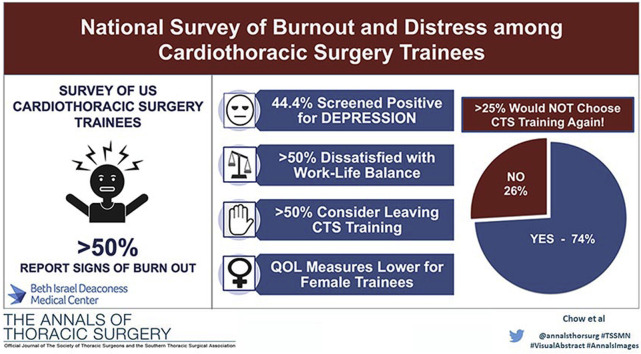- Record: found
- Abstract: found
- Article: not found
National Survey of Burnout and Distress among Cardiothoracic Surgery Trainees

Read this article at
Abstract
Background
Burnout has been linked to poor job satisfaction, increased medical errors, and is prevalent among healthcare professionals. We sought to characterize burnout and distress among US cardiothoracic surgical (CTS) trainees.
Methods
A 19-question survey was sent to CTS trainees in collaboration with the Thoracic Surgery Residents Association. We queried sociodemographic variables, balance/quality of life (QOL), and indicators of depression and regret. We included questions along the emotional exhaustion, depersonalization, and personal accomplishment subscales of the Maslach Burnout Inventory.
Results
The survey was sent to 531 CTS trainees across 76 institutions and there were 108 responses (20.3%). Over 50% of respondents expressed dissatisfaction with balance in their professional life and over 40% screened positively for signs of depression. Over 25% (n=28) of respondents would not complete CTS training again, given a choice. More than half met criteria for burnout on emotional exhaustion and depersonalization subscales. CTS residents with children were more likely to express regret towards pursuing CTS training. A greater proportion of women than men reported poor levels of balance/QOL during training as measured by missed health appointments, negative impact on relationships, and self-perception. Similarly, those in the final three years of training were more likely to report poor levels of balance/QOL.

